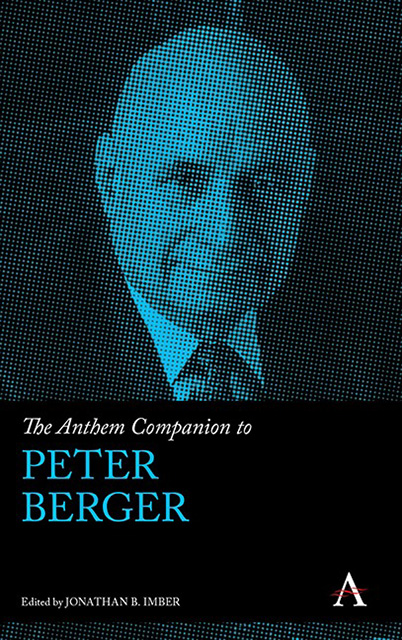Book contents
- Frontmatter
- Contents
- Introduction
- Chapter 1 Plurality, Choice, and The Dynamics of Doubt
- Chapter 2 Peter L. Berger and The Challenge of Modern Pluralism
- Chapter 3 Making Peace With Pluralism In America
- Chapter 4 Religion and Secularity in A Desecularizing Russia
- Chapter 5 The Moral Limits of Religious Pluralism
- Chapter 6 Peter L. Berger and Arnold Gehlen: Secularization, Institutions and Social Order
- Chapter 7 Peter L. Berger’s Three Religions
- Chapter 8 Objectivation: The Material Heritage of Peter L. Berger
- Chapter 9 Peter L. Berger’s The Social Construction of Reality
- Chapter 10 The Untaken Road to Phenomenological Sociology
- Chapter 11 Cheering for Capitalism
- Chapter 12 Peter L. Berger and Economic Sociology
- Chapter 13 Peter L. Berger Changed The Direction of My Work … and My Life
- Chapter 14 Peter L. Berger On Religion as Choice Rather Than Fate
- List of Contributors
- Index
Chapter 6 - Peter L. Berger and Arnold Gehlen: Secularization, Institutions and Social Order
Published online by Cambridge University Press: 17 October 2023
- Frontmatter
- Contents
- Introduction
- Chapter 1 Plurality, Choice, and The Dynamics of Doubt
- Chapter 2 Peter L. Berger and The Challenge of Modern Pluralism
- Chapter 3 Making Peace With Pluralism In America
- Chapter 4 Religion and Secularity in A Desecularizing Russia
- Chapter 5 The Moral Limits of Religious Pluralism
- Chapter 6 Peter L. Berger and Arnold Gehlen: Secularization, Institutions and Social Order
- Chapter 7 Peter L. Berger’s Three Religions
- Chapter 8 Objectivation: The Material Heritage of Peter L. Berger
- Chapter 9 Peter L. Berger’s The Social Construction of Reality
- Chapter 10 The Untaken Road to Phenomenological Sociology
- Chapter 11 Cheering for Capitalism
- Chapter 12 Peter L. Berger and Economic Sociology
- Chapter 13 Peter L. Berger Changed The Direction of My Work … and My Life
- Chapter 14 Peter L. Berger On Religion as Choice Rather Than Fate
- List of Contributors
- Index
Summary
For sociologists of my generation, our introduction to undergraduate sociology was typically through Peter L. Berger’s Invitation to Sociology (1963). I still possess my Penguin paperback copy, which I bought while at the University of Leeds in 1968. The Invitation is well written and packed with illustrations that an average student could understand and remember. The basic theory behind the book is somewhat hidden, and few students would have taken much notice of the limited references in the footnotes to the German sociologist Arnold Gehlen (1904–1976), who in many ways is the theoretical backbone of the book. Gehlen’s sociology is complex and challenging, but the basic idea is that animals are driven and determined by their instincts, while humans also have instincts, their lives are determined and guided by social institutions. To quote Berger (1963, 104) “Gehlen conceives of an institution as a regulatory agency, channeling human actions in much the same way as instincts channel animal behavior.” He then gives a typical Berger example. When a young man meets a young woman and falls in love, the institutional imperative declares “Marry! Marry! Marry!” What we might want to say now is that, while animal instincts are permanent, institutions are not. Since the 1960s, the institution of marriage has been radically transformed to include same-sex marriage or no marriage at all. Institutions address the problem of social order, but that order is changing and fragile.
For my “disobedient generation” (Sica and Turner, 2005) in the 1960s, Berger’s sociology carried a radical, if somewhat hidden, doctrine that institutions are socially constructed and can be, with some political effort, de-constructed and re-shaped to meet new needs and ideas. The underlying radical view of knowledge in the Invitation was not explicit. With Thomas Luckman, a more complete and sophisticated view of knowledge was to appear three years later as The Social Construction of Reality. A Treatise in the Sociology of Knowledge (Berger and Luckmann, 1966). The book contributed to the emergence of an influential movement in modern sociology called “social constructionism,” which has radical implications for how we understand social institutions and their legitimacy.
- Type
- Chapter
- Information
- The Anthem Companion to Peter Berger , pp. 61 - 74Publisher: Anthem PressPrint publication year: 2023

